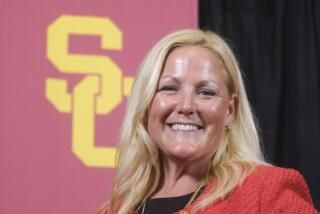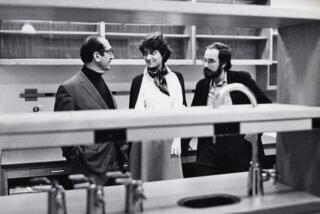Countywide : Setting Girls on Paths to Science Jobs
When she speaks to girls about pursuing science careers, author and engineering consultant Judith Cohen often finds that age makes a difference.
Elementary school students “see no boundaries,” she said, while older girls tend to be more image conscious.
“When you start talking to girls in high school and junior high school, they’re concerned about how people will view them,” Cohen said. “If it’s not considered ladylike to be a scientist, they’re a little concerned about it.”
Cohen, who spoke at Bookstar Tustin recently, is the author of a seven-book series that includes such titles as “You Can Be a Woman Engineer,” “You Can Be a Woman Marine Biologist” and “You Can Be a Woman Zoologist.”
The author is to lecture at two Barnes & Noble bookstores in the county, on Feb. 23 in Costa Mesa and April 18 in Brea.
Cohen said her books are designed to expand the career plans of girls ages 10 through 14.
“We want the kids to visualize themselves doing this--going under the ocean in a submersible, working with animals in the zoo,” Cohen said. “But for me, when I was growing up, you didn’t see as much of that sort of thing.”
The 61-year-old Culver City resident said she doesn’t remember seeing any female engineering students in her USC classes during the 1950s.
But she does remember being kidded by her male colleagues when she was working as an electrical engineer in the 1960s.
“I would get teased,” said Cohen, who worked on the Apollo lunar landing mission and the Hubble Space Telescope. But the percentage of female scientists “changed very dramatically in the 1970s,” she said, “when they came up with the affirmative-action plans.”
Although many more women are involved in science careers today, Cohen said women are still underrepresented.
But she hopes that television and personal computers are helping change attitudes about sex roles.
“When I grew up, we didn’t have television,” she said. “I had no idea about the possibilities. I didn’t even know what an engineer was. I think another thing is people having computers in their homes,” Cohen said. “I think that’s a real good opportunity for girls.”
Cohen said some people continue to believe that boys are automatically better at science and mathematics than girls.
“I hear that sometimes,” she said. “I feel that science and math are probably unique talents, like music. Not everybody has it, but I don’t think it is sexually segregated.”
More to Read
Sign up for Essential California
The most important California stories and recommendations in your inbox every morning.
You may occasionally receive promotional content from the Los Angeles Times.










